In the Montessori approach, the kitchen becomes a nurturing space for children to develop their independence and practical life skills. As they engage in preparing meals and cleaning up, they gain confidence, fine tune their motor skills, and learn essential tasks that will benefit them throughout life.
A Montessori kitchen allows children to explore their curiosity, make choices, and take responsibility for their actions. This article explores the benefits of the Montessori kitchen in fostering independence and the development of practical life skills in children.

What is a Montessori Kitchen?
Welcome to the world of the Montessori kitchen, where children not only learn to cook and clean, but also gain valuable life skills along the way. The Montessori philosophy embraces hands-on learning and encourages children to be self-sufficient from an early age.
By engaging in daily kitchen activities, children develop a sense of independence and confidence that extends far beyond culinary endeavors. In this article, we delve into the wonders of the Montessori kitchen and discover how it nurtures independence and practical life skills in children.
Get ready to be inspired by the powerful impact of the Montessori approach in the kitchen. Let's dive in!
The Importance of Practical Life Skills in Child Development
Practical life skills play a crucial role in a child's overall development. These skills not only help children become more self-reliant but also foster their cognitive, emotional, and social growth.
When children engage in practical tasks, such as cooking, cleaning, and organizing, they learn to be responsible, develop problem-solving abilities, and enhance their fine motor skills.
The Montessori approach recognizes the significance of practical life skills and integrates them seamlessly into everyday activities, making the kitchen an ideal setting for children to learn and thrive.
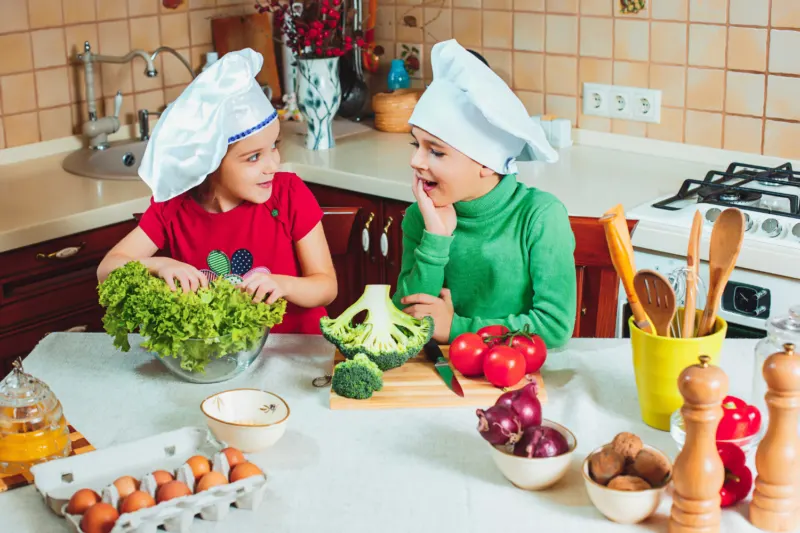
How the Montessori Kitchen Supports Independence and Practical Life Skills
A Montessori kitchen provides a safe and nurturing environment for children to explore their curiosity and develop independence. In a Montessori-inspired kitchen, children are encouraged to take an active role in meal preparation, from washing fruits and vegetables to cutting and measuring ingredients.
By allowing children to participate in these activities, they not only learn essential cooking skills, but they also gain a sense of accomplishment and pride in their work.
A Montessori kitchen empowers children to make choices, problem-solve, and take responsibility for their actions, thus fostering their independence and self-confidence.
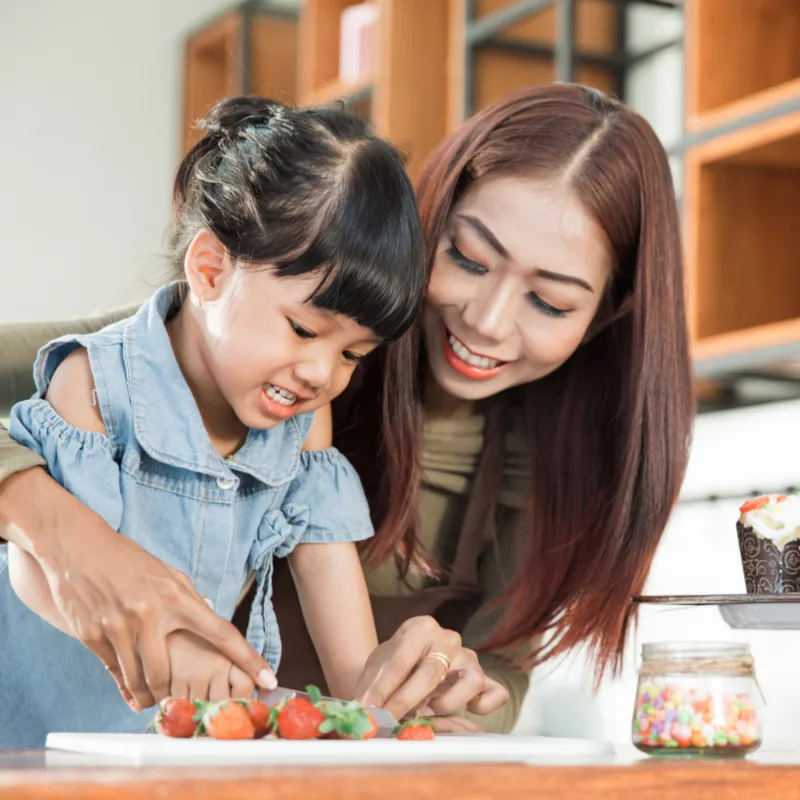
Setting up a Montessori-Inspired Kitchen at Home
Creating a Montessori-inspired kitchen at home is easier than you might think. The key is to create a child-friendly space that allows children to access and use kitchen tools and materials independently. Start by organizing low shelves or drawers where children can easily reach and return items.
Use child-sized utensils, such as knives with rounded edges and small mixing bowls, to ensure safety and comfort. Additionally, consider creating designated areas for different kitchen tasks, such as a washing station for fruits and vegetables or a chopping station for cutting ingredients.
By setting up a Montessori-inspired kitchen at home, you provide your child with the opportunity to develop independence and practical life skills in a familiar and comfortable environment.
Age-Appropriate Kitchen Tasks for Children
In the Montessori kitchen, children are encouraged to take on age-appropriate tasks that align with their developmental abilities. For toddlers, simple tasks like stirring ingredients, washing fruits, or tearing lettuce can be introduced.
As children grow older, they can gradually take on more complex tasks, such as measuring ingredients, peeling vegetables, or using small kitchen appliances under adult supervision. By gradually increasing the complexity of tasks, children develop their skills and gain confidence in the kitchen.
It is important to remember that each child is unique, and tasks should be tailored to their individual abilities and interests.
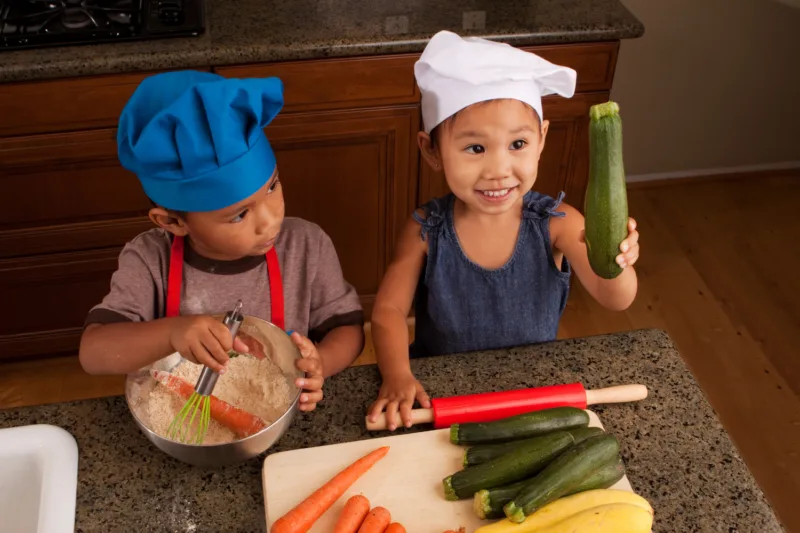
Teaching Kitchen Safety and Hygiene in the Montessori Kitchen
Safety and hygiene are paramount in the Montessori kitchen. Teaching children about kitchen safety rules and proper hygiene practices is essential to ensure a safe and enjoyable cooking experience. Start by explaining the importance of washing hands before and after handling food.
Demonstrate how to handle sharp objects, such as knives, with caution, and teach children to use oven mitts or pot holders when handling hot items. Additionally, instill the habit of cleaning up spills promptly and keeping the kitchen area tidy to prevent accidents.
By incorporating safety and hygiene lessons into the Montessori kitchen, children learn to prioritize their well-being and develop lifelong habits.
Benefits of Cooking and Baking in the Montessori Kitchen
Cooking and baking in the Montessori kitchen offer numerous benefits beyond the delicious end result. When children engage in cooking and baking activities, they develop their fine motor skills through tasks like whisking, kneading dough, or decorating cupcakes.
These activities also promote cognitive development as children follow recipes, measure ingredients, and make decisions about flavor combinations. Furthermore, cooking and baking foster creativity, encourage teamwork when cooking with others, and provide an opportunity for children to practice patience and perseverance. The Montessori kitchen truly becomes a space for holistic growth and learning.

Incorporating Nutrition Education in the Montessori Kitchen
The Montessori kitchen provides an excellent platform to introduce children to the importance of nutrition and healthy eating habits. By involving children in meal planning, grocery shopping, and meal preparation, they gain a deeper understanding of where food comes from and how it affects their bodies.
Engage children in discussions about the nutritional value of different foods and the benefits of a balanced diet. Encourage them to explore new flavors and textures, and involve them in growing herbs or vegetables in a small garden. By incorporating nutrition education in the Montessori kitchen, children develop a lifelong appreciation for healthy eating.
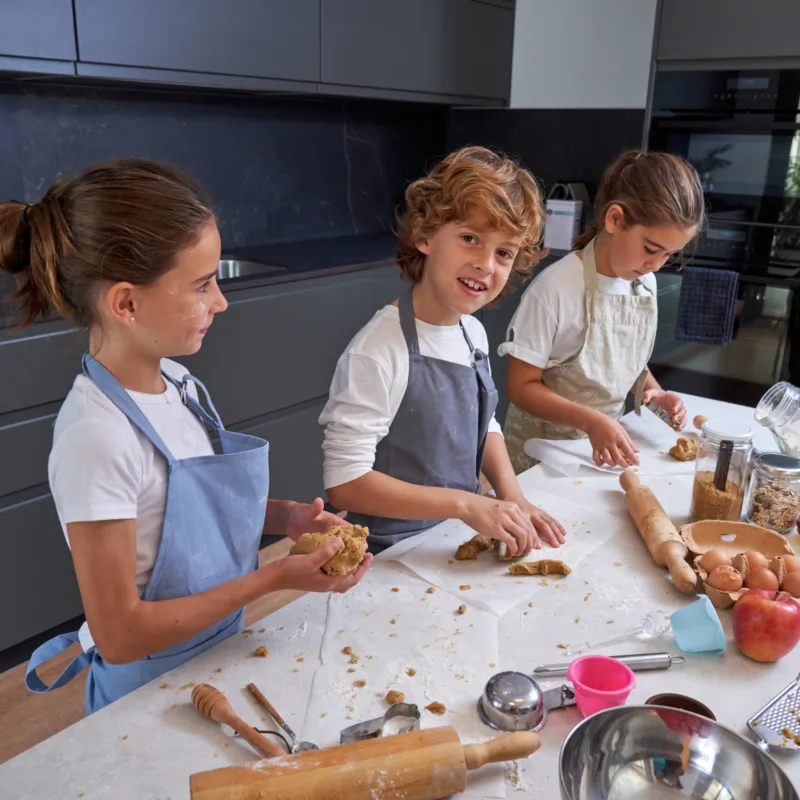
Montessori Kitchen Materials and Tools
The Montessori kitchen is equipped with a variety of materials and tools designed to support children's independence and practical life skills. Child-sized knives, cutting boards, and utensils are essential for safe and comfortable food preparation.
Small pitchers and bowls allow children to pour and measure liquids independently. Mixing bowls, whisks, and spatulas enable children to participate in mixing and stirring ingredients.
Additionally, having child-friendly cleaning supplies, such as spray bottles and sponges, encourages children to take responsibility for cleaning up after cooking. These carefully chosen materials and tools empower children to actively engage in the kitchen and develop their practical life skills.
Recommended Montessori Kitchen Set for Toddlers
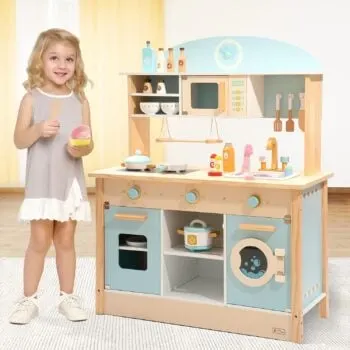
ROBUD Wooden Play Kitchen Set for Kids
Perfect for age 3 and up. The set is solid wood, sturdy, and durable. The play set is extremely realistic and contains everything needed for preparing food. The knobs make sounds when they turn that adds to the realism. Inspires imaginary play while working on fine motor and problem solving skills.
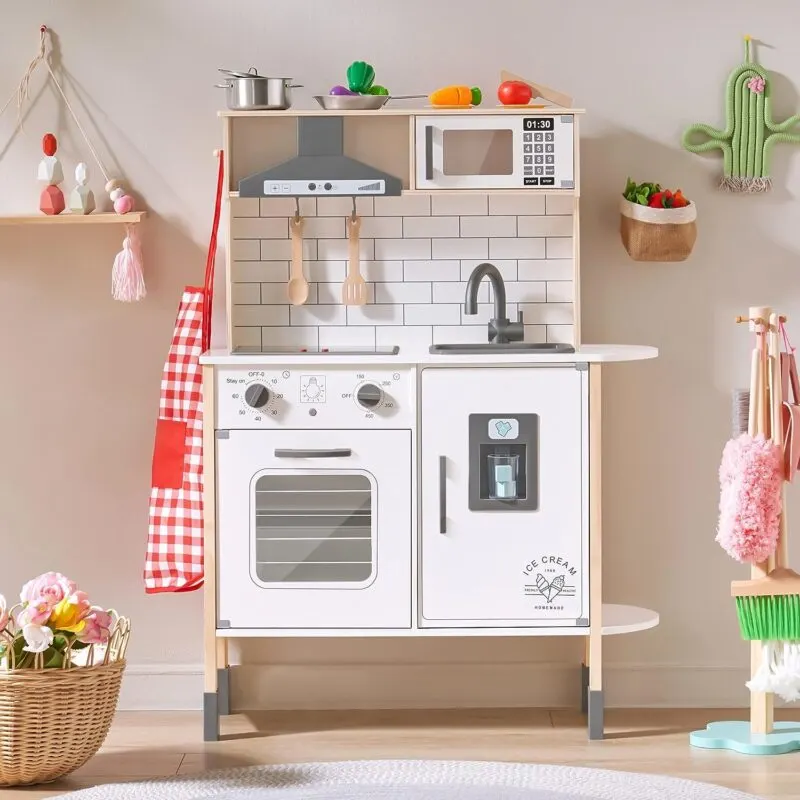
Tiny Land Play Kitchen for Kids
This high quality wooden play kitchen will engage your child. The set has real lights and kitchen sounds that will delight children. Comes with an 18 piece kitchen tool set to add to the pretend play fun!
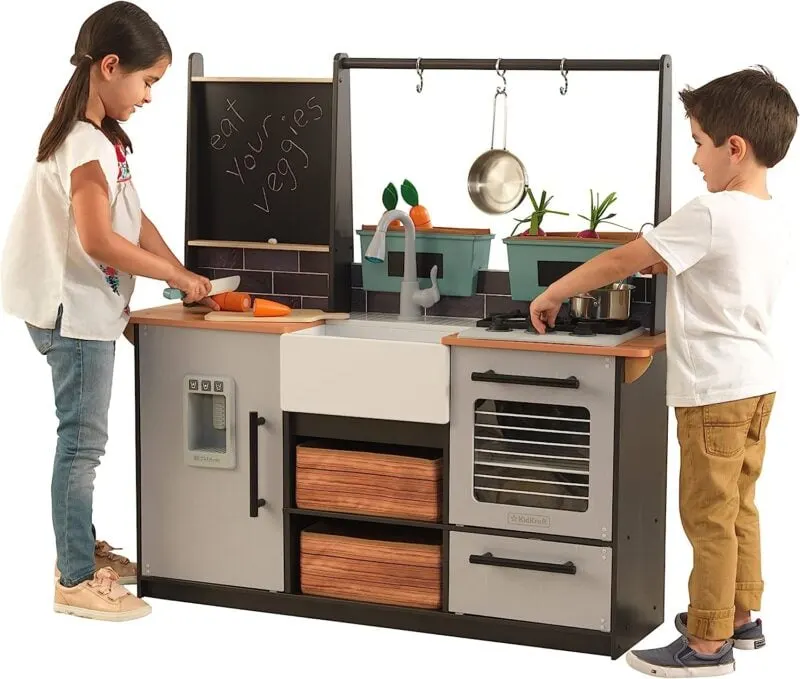
KidKraft Wooden Farm to Table Play Kitchen
This realistic wooden kitchen play set won't be an eye sore for your home! It's modern look will actually add to the ambiance! The set comes with planters with vegetables in the dirt plus a chalkboard! The ice maker even dispenses cubes! The faucet sounds, sizzling, and lights adds to the play!
The Montessori kitchen is a powerful space for nurturing independence and practical life skills in children. By involving children in meal preparation, teaching kitchen safety and hygiene, and incorporating nutrition education, the Montessori kitchen offers countless opportunities for growth and learning.
Through cooking and baking, children enhance their fine motor skills, develop cognitive abilities, and cultivate a sense of responsibility. The Montessori kitchen truly becomes a place where children can flourish and gain valuable life skills that will benefit them well into adulthood.
So, why not embrace the wonders of the Montessori kitchen and watch your child thrive in their journey towards independence? Start creating your own Montessori-inspired kitchen today and witness the magic unfold!
